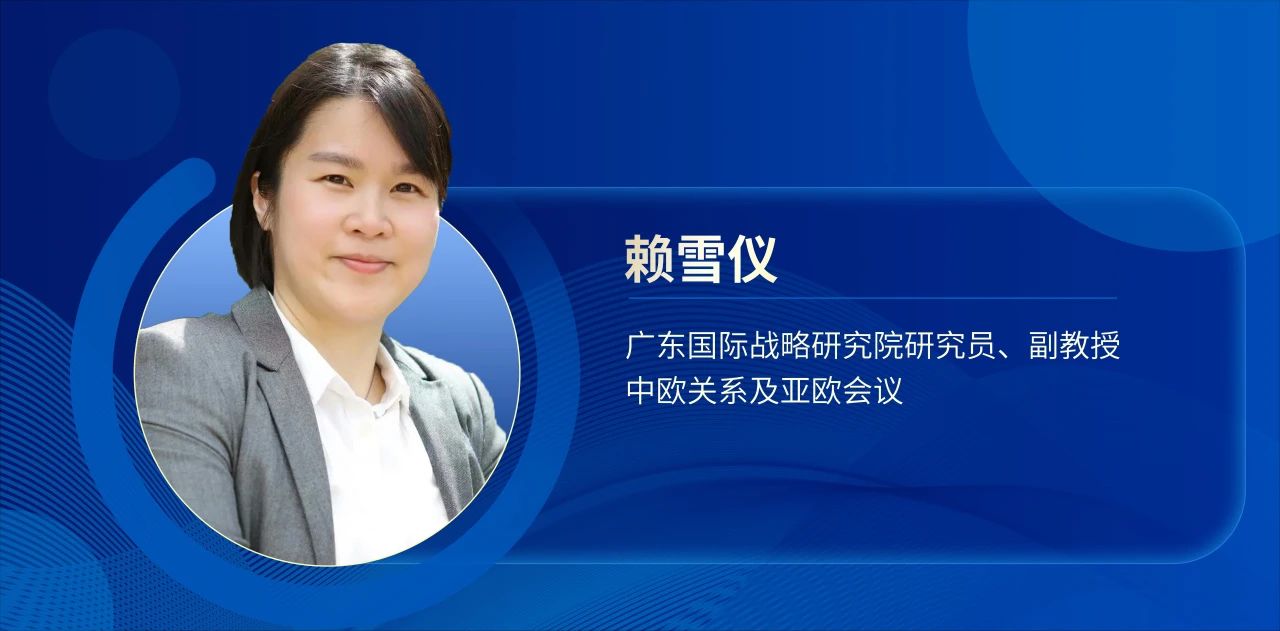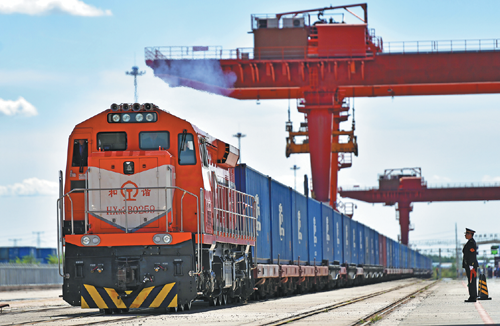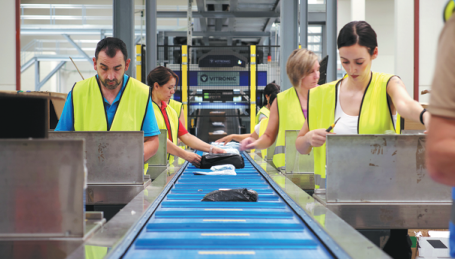当前,中欧关系虽然存在诸多分歧和挑战,但双方都在寻求稳定和发展。近日,我院赖雪仪副教授就此接受《China Daily》的采访时表示这次北京峰会恢复了面对面交流,这无疑是一个积极因素。我们应该专注于实际的沟通和理解,这表明中国和欧盟都走上了互相尊重分歧的道路。

以下为采访原文:
China, EU make strides toward strengthening ties
Despite challenges, leaders see avenues for growth, mutual benefits at summit

A China-Europe freight train bound for Europe is seen at a cargo consolidation hub in Shenyang, Liaoning province, on Sept 19. YANG QING/XINHUA
China and the European Union are seeking to stabilize and expand their relations despite differences and challenges on multiple fronts.
Ding Chun, director of the Center for European Studies at Fudan University in Shanghai, said the 24th China-EU Summit held in Beijing on Dec 7 has shown that China-EU relations this year "began low but ended high", referring to the tougher tone earlier on the EU side, which had often parroted Washington's rhetoric.
"It shows that the two sides are looking to the future and are more pragmatic in tackling differences. This is an important step in stabilizing the relationship," Ding said.
Bilateral relations have deteriorated in the past few years amid increasing geopolitical tensions between China and the United States, and with the Russia-Ukraine conflict now in its 23rd month.
Tit-for-tat sanctions between China and the EU in 2021 led the European Parliament to freeze the ratification of the China-EU Comprehensive Agreement on Investment, which concluded in December 2020 after seven years of negotiations.
However, leaders on both sides have attached great importance to the bilateral relationship at the latest Beijing summit.
Chinese President Xi Jinping told EU leaders attending the summit — European Council President Charles Michel and European Commission President Ursula von der Leyen — that China and the EU are two major forces advancing multipolarity, two major markets in support of globalization and two major civilizations championing diversity.
The bilateral relations are showing a good momentum of consolidation and growth, he said, and the China-EU high-level dialogues in the strategic, economic and trade, green and digital fields have produced rich outcomes.
"This serves the interests of both sides and meets the expectations of our peoples," he said.
"As China pursues high-quality development and high-standard opening-up, it sees the EU as a key partner for economic and trade cooperation, a preferred partner for scientific and technological cooperation, and a trustworthy partner for industrial and supply chain cooperation."
The summit took place following several high-level dialogues and visits.
In October, EU foreign policy chief Josep Borrell and Chinese Foreign Minister Wang Yi held the 12th China-EU High-Level Strategic Dialogue in Beijing, while European Commission Executive Vice-President Valdis Dombrovskis co-chaired the 10th China-EU High-level Economic and Trade Dialogue with Chinese Vice-Premier He Lifeng in Beijing in September.
Michel also applauded the relaunch of high-level dialogues on important issues.
"We are united in our commitment to pursue a stable and mutually beneficial relationship with China, a commitment and a relationship that we wish to be based on the principles of transparency, predictability and reciprocity," he said, citing the EU's China policy coming out of the EU summit in June.
Von der Leyen described her second trip to China this year as demonstrating how the EU attaches importance to its major relationship with China.
"We have massive trade between us — 2.3 billion euros ($2.5 billion) a day — and important investment stakes in each other's economies," she said.
Bilateral trade of goods between China and the EU hit a record high of 857 billion euros last year, an increase of 23 percent year-on-year, according to EU statistics. China and the EU are each other's second-largest trade partner.

Tourists visit the Chinese Duojing-Garden in Luisenpark of Mannheim in southwestern Germany on July 14. The garden was built in 2001 using traditional methods and materials and was created by Chinese craftsmen from Mannheim's twin city, Zhenjiang of Jiangsu province. ZHANG FAN/XINHUA
Shared interest
"And as major powers in the world, the European Union and China have global responsibilities. We have a shared interest in peace and security, in the effective functioning of the rules-based international order, and to find solutions to global challenges," von der Leyen said.
This month's Beijing summit covered a wide range of issues from strategic bilateral relations to global governance and global and regional hot spot issues.
Lai Suetyi, an associate professor of the Center for European Studies at the Guangdong University of Foreign Studies, said the 24 summits from 1998 to 2023 show how important China and the EU see each other.
"The return to face-to-face setting this time is definitely a positive element. Also, having the high-level people-to-people dialogue relaunched is good news," she said.
"We cannot deny that mistrust has grown in the past few years. Henceforth, dialogue becomes even more essential."
Lai dismissed the criticism on the absence of joint statement or joint news conference, and said she sees it as a maturity of the relationship.
"We should not be tied by bureaucracy, but focus on actual communication and understanding. Moreover, it demonstrates that both China and the EU walk the walk that we can respect our differences."
A new EU policy on China since March 2019 defines the latter as a cooperation partner, economic competitor and systemic rival. China has voiced strong disagreement over the term "systemic rival" since many Chinese people associate the words with hostility and confrontation.
China has emphasized the China-EU comprehensive strategic partnership, which marks its 20th anniversary this year.
Following the 12th round of China-EU High-Level Strategic Dialogue in Beijing on Oct 13, Wang said, "China and the EU are partners first and foremost, with far more consensus than differences."
Borrell said in a blog post on Dec 12 that Chinese partners pushed back against being labeled a "systemic rival" in certain areas and argued that China does not wish to engage in systemic rivalry.
"To them, the word 'rival' might convey a sense of 'enemy', a connotation that it does not have in English," Borrell wrote. "We are indeed rivals, not enemies."
The Chinese side is also dissatisfied with the new EU rhetoric about "de-risking".
Von der Leyen has repeatedly said the EU does not want to decouple from China but "de-risk". EU officials have expressed that the "de-risking" is not aimed at China, but other countries as well, including the US when the likelihood for Donald Trump winning the 2024 presidential election is high.
EU officials also argued that China's policy to achieve self-reliance in certain industries is also a "de-risking" strategy.

Staff members work at a Cainiao logistics center in Madrid, Spain, on July 31. The train service from the Chinese small commodity hub of Yiwu in Zhejiang province to the European commodity center of Madrid was launched in 2014, spanning eight countries in Eurasia. MENG DINGBO/XINHUA
Rhetoric rebutted
But Chinese officials do not buy the argument.
"'De-risking' and 'reducing dependence' should not evolve into throwing away and weakening cooperation," China's Foreign Ministry spokesman Wang Wenbin said on Nov 30.
Von der Leyen's announcement in her State of the Union Address on Sept 13 that the EU will launch an anti-subsidy investigation into EU imports of battery electric vehicles has caused an uproar in China.
China's Ministry of Commerce spokesman He Yadong said the investigation process is not transparent and the results are unfair. He described the measure as "a discriminatory approach" toward Chinese electric vehicle makers and is "suspected of violating World Trade Organization rules". He also urged the EU to abandon trade protectionism.
The German Association of the Automotive Industry is also critical of the EU investigation, fearing that it could trigger a tit-for-tat trade war between the EU and China.
Cora Jungbluth, a senior expert on China and the Asia-Pacific at the private foundation Bertelsmann Stiftung in Germany, said the case of China's EV industry is much more complex, and its rise should not be attributed to only subsidies, but more importantly, the early start such as in the promotion of battery systems in China's five-year plan.
China became the world's largest market for EV sales last year, with a share of 60 percent. Meanwhile, it accounted for 35 percent of EV exports. They included foreign carmakers such as Tesla that jumped on the Chinese bandwagon.
Jungbluth does not believe that the EU's threat of imposing anti-dumping duties on Chinese EVs will work.
"The economic success (of the duties) is likely to be limited as the lessons from the solar industry have taught us," she wrote on the foundation's website. Last year, more than 90 percent of the EU's solar panels were imported from China.
Voicing concern
In its annual report released last month, the China Chamber of Commerce to the EU voiced its concern over the EU's anti-subsidy investigation and other discriminatory policies against Chinese companies.
Chinese companies' evaluation of the EU's business environment has declined for the fourth consecutive year because of the bloc's "de-risking" strategy and its policy measures targeting Chinese investors.
The report warned the EU not to politicize critical business matters, particularly in key areas such as information and communication technology, EVs and renewable energy. The EU's description of Chinese telecom company Huawei as a "high-risk vendor" has been viewed as discriminatory.
Unlike her previous rhetoric which is heavy in ideology, von der Leyen has now placed more emphasis on economic and trade issues, especially the EU's trade deficit with China.
She said Europe will not tolerate its soaring trade imbalance with China forever.
China has argued that the trade deficit is a result of the growing competitiveness of Chinese products in the global marketplace, the EU's export control on high-tech products to China and the fact that many EU companies that invested in China are exporting their products back to Europe.
Wang Wenbin said China has a trade surplus with the EU on the surface, but a substantial part of profits was pocketed by European companies.
"China has never deliberately sought to maintain a trade surplus," he said.
Lai said the future development of China-EU relations will also be affected by next year's election results of the European Parliament and US president.
"Uncertainty is high," Lai said. "One thing I am certain, that is China-EU relations will get even more complicated."
文章来源:《China Daily》


